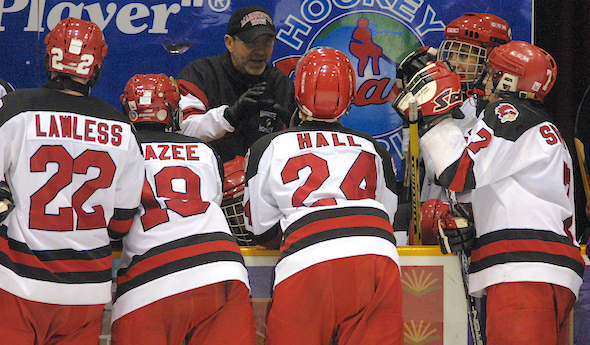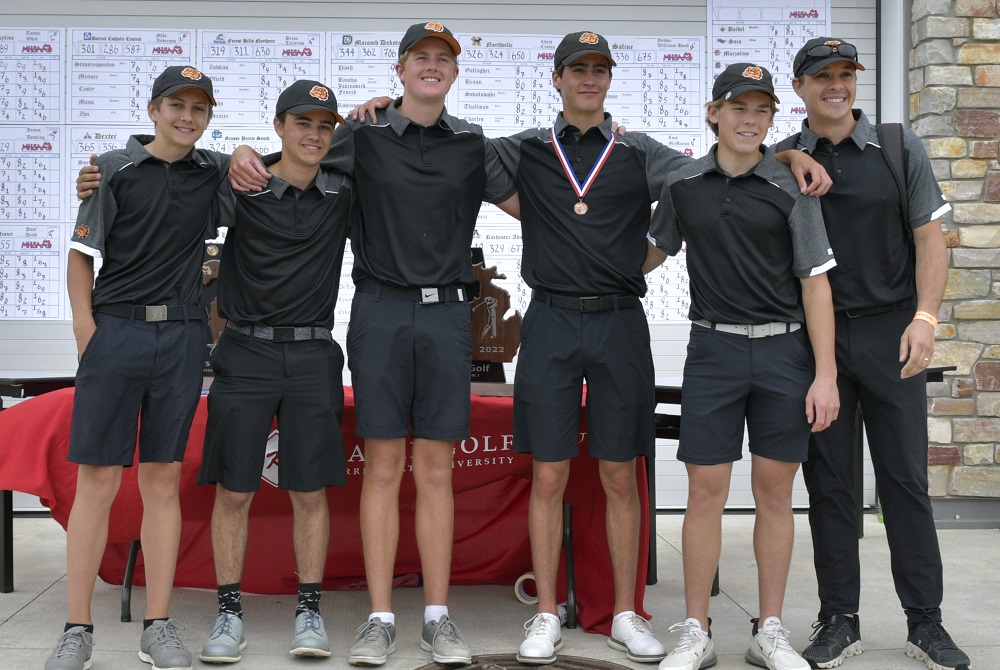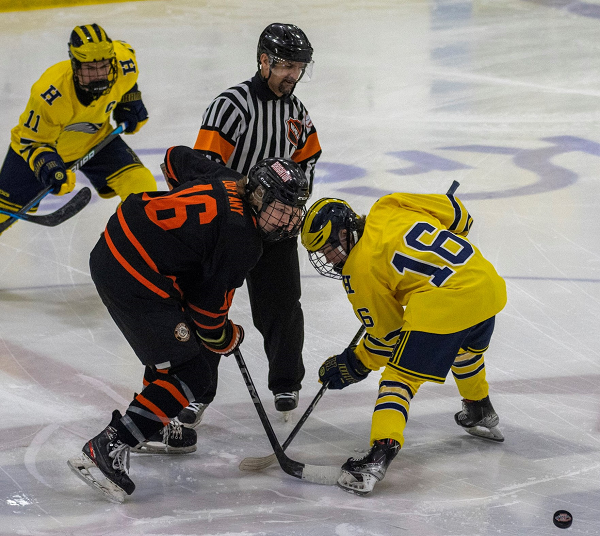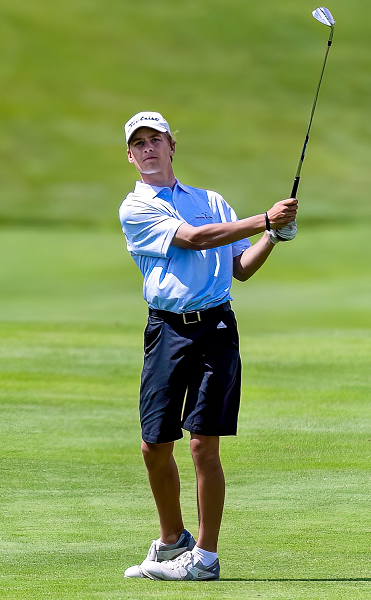
#TBT: 2002 Ends with Lights-Out Finals
July 12, 2019
By Rob Kaminski
MHSAA benchmarks editor
The Flint IMA had been to the MHSAA Ice Hockey Finals what Joe Louis Arena was to the Detroit Red Wings since it began hosting high school championships in the state in 1977.
For parts of four decades, the facility set the scene for many memorable moments on ice for scholastic skaters.
So it would have been fitting as the curtain was closing on an era March 9, 2002, if there’d been an overtime championship game or two to commemorate the last MHSAA Finals at the building.
In 2003, the MHSAA Semifinals and Finals would move to Compuware Arena in Plymouth – now USA Hockey Arena – where the event has been played ever since.
There would be no overtimes during the IMA’s swan song, but the arena wasn’t about to let go without a fight. Following the morning’s Division 2 Final, won by Grosse Pointe North over local qualifier Davison, things got strange.
As if by divine intervention, a significant power outage hit the Flint area between the first and second periods of the Division 3 Final, necessitating a return to the building for an encore performance that Monday.
Following is an account from then-MHSAA Assistant Director Randy Allen, administrator of the sport at that time.
 “East Grand Rapids and (Dearborn) Divine Child were between the first and second periods when the power went out at what must’ve been around three in the afternoon. Some of the house lights went on, but there was no huge generator. The power company told us it could be quite a while before the power came back, so the decision was made pretty quickly to come back Monday. (Editor’s Note: MHSAA regulations at that time prohibited Sunday competition, thus play would resume Monday)
“East Grand Rapids and (Dearborn) Divine Child were between the first and second periods when the power went out at what must’ve been around three in the afternoon. Some of the house lights went on, but there was no huge generator. The power company told us it could be quite a while before the power came back, so the decision was made pretty quickly to come back Monday. (Editor’s Note: MHSAA regulations at that time prohibited Sunday competition, thus play would resume Monday)
“Finishing the game in progress Monday was really a no-brainer, but now there were a couple of immediate challenges. First, how were we going to let people know, and second, what was going to happen to the (Detroit) Catholic Central-Marquette Division 1 game coming up later in the day?
“Well, knowing what I knew about the TV business (Allen’s background in Wisconsin included sportscasting), I grabbed one of the television reporters there, probably from Grand Rapids, and asked him to come down to the ice with me. It was totally dark; I figured once he put his camera lights on, it would get the attention of the crowd, which it did. So there’s about 2 or 3 thousand people in the arena – in the dark – and I’m standing in front of a light from a TV camera, and at the top of my voice I explain the situation and let them know we’re coming back Monday.
“Anyone wanting to come back, admission was free of charge, and we’d trust they were at the game. If they wanted a refund, they could mail their ticket stub to MHSAA and we'd send a refund. We obviously couldn’t use the box office without power. I don’t recall more than a couple dozen refund requests coming to our office later.
“Now the real challenge is the Division 1 game. Marquette very, very much wanted to go home and come back a week later. They’d been on the road all week (Marquette won a Quarterfinal in Traverse City that Wednesday). Jack (Roberts, former MHSAA executive director) was there, and he and Marquette’s AD (Scott Koski) and their superintendent debated a bit. In the end, the regulations of the day were upheld, and the game would be Monday.
“As it turned out, someone in the Marquette entourage had a contact in the Detroit Pistons front office, so the team was entertained in a suite at The Palace of Auburn Hills on Sunday night, so that was quite a happy ending from their standpoint.
“Many of the Marquette people were either in the arena or at a single hotel or two in the area, so alerting them to the change was not difficult.
“But then we started to think, ‘What about the Detroit CC people who would be driving up for their game later? Remember, social media was not as prevalent as it is today, or even the dependence on the internet.
“So, Saturday night, I sat there at the entrance to the IMA with my car running and lights on to inform the CC fans and anyone else who pulled up that the game had changed ... ‘Power’s out; game’s on Monday.’ They'd say thanks, and out they'd go. No one really got angry; there wasn’t anything anyone could do. I sat there an hour and a half with a steady stream, and shortly after the scheduled game time I called it a night.”
And, the IMA called it the end of an era, but not before hanging on for one more night, when Divine Child and Detroit CC would raise the last trophies in that building ... under the lights.
PHOTOS: (Top) Marquette was among teams that needed to stick around Flint two more days to play in the 2002 MHSAA Ice Hockey Finals. (Middle) Flint’s IMA arena.

Hockey Players Transferring Winter Puck Skills to Spring Golf Swings
By
Tom Lang
Special for MHSAA.com
May 26, 2023
When the Michigan seasons shift from winter to spring, some high school golf teams are a little more eager than others for the hockey season to officially end.
This is especially true for the school golf programs in Brighton, Hartland and Muskegon Mona Shores – examples of boys teams that love having hockey players transition from the indoor frozen ice to play golf outdoors on the lush green grass.
“I would take a golf team full of hockey players any day,” said Hartland golf coach Nathan Oake. “I love them.”
We can tell, because his program is full of them.
Hartland and Brighton each have eight hockey players on their 16-golfer varsity and JV rosters.
Mona Shores has three hockey players this year, but usually has more. In 2023 it’s Oliver MacDonald (all-state honorable mention in hockey), Nathan McNarland and Nicholas Taylor, who was voted Division 1 all-state golf last spring, then leading his team to fifth place at the MHSAA Lower Peninsula Division 1 Final.
 Brighton golfer Winston Lerch was also Division 1 all-state last year in golf and an assistant captain on the hockey team this winter that finished Division 1 runner-up to Detroit Catholic Central. Here in 2023, he shot a 65 to open the season at Oakland University for medalist and has committed to Grand Valley State for golf with his 72-stroke average.
Brighton golfer Winston Lerch was also Division 1 all-state last year in golf and an assistant captain on the hockey team this winter that finished Division 1 runner-up to Detroit Catholic Central. Here in 2023, he shot a 65 to open the season at Oakland University for medalist and has committed to Grand Valley State for golf with his 72-stroke average.
Joining Lerch in the Bulldogs boys golf program are hockey players like Levi Pennala, winner of hockey’s Wall Award sponsored by State Champs as the top high school goalie. Pennala – who recently shot 72 at the Kensington Lakes Activities Association championship tournament, his career low for high school golf – finished in the top 30 last year at the LPD1 Final. Then early this spring when he was away at a high-level junior hockey tournament, freshman hockey player Adam Forcier stepped in and shot a school record 18-hole round for a freshman at 73. Jacob Daavetilla also works into the starting lineup at times.
Forcier tied the record of Davis Codd – who, as a pro hockey player on leave from the Saginaw Spirit OHL hockey team when COVID-19 shut down the league, won the LPD1 Final in 2021 for Brighton.
Brighton golf coach Jimmy Dewling said Codd was one of the earliest to prove to others you can play both hockey and golf and excel. In fact, that June in 2021, Codd went to an NHL scouting camp in Pennsylvania before the Golf Finals, drove overnight back to Forest Akers to play the two championship rounds, won the title, then immediately returned to Pennsylvania to resume the hockey camp.
“On our team, we believe, and TBone (Codd) was a perfect example of it, if there’s any time you have the opportunity to be competitive, it is going to make you a more well-rounded competitor and therefore better at your particular sport,” Dewling said.
“We like hockey players. In the winter, they have to think to where the puck is going, be smart enough to react, and understand how that emotion is going to carry over from one play to the next. When it’s your shift you have to forget about the last shift, or take something from the last shift and put it into the next shift, to have consistent play.
“It’s the same on the golf course,” Dewling continued. “It’s one hole to the next, one shot at a time, being tough, and that’s only going to come from competition reps. We love the athletic ability more so than anything; the toughness and competitiveness all year.”
In addition to Lerch and Pennala starting on varsity golf, they are joined by traditional golfers Matt Doyle, Riley Morton and Andrew Daily, who is committed to Wayne State and finished LPD1 runner-up last spring.
 Going into the 2023 golf postseason, Brighton is ranked No. 2 in Division 1. The Bulldogs have won the Next Tee Invite at Oakland Hills, the North Star Invite at Plum Hollow and the KLAA Conference Championship – earning Brighton’s first conference title since 2007. The Bulldogs also were runners-up at The Meadows Invite at Grand Valley State University. The team is averaging 297 for 18 holes.
Going into the 2023 golf postseason, Brighton is ranked No. 2 in Division 1. The Bulldogs have won the Next Tee Invite at Oakland Hills, the North Star Invite at Plum Hollow and the KLAA Conference Championship – earning Brighton’s first conference title since 2007. The Bulldogs also were runners-up at The Meadows Invite at Grand Valley State University. The team is averaging 297 for 18 holes.
Oake admitted this is a rebuilding year for Hartland’s golf program. The varsity lineup has only two returning players with varsity golf experience – Keller King and Brady Betteley.
“So, we opted to keep a group of tough competitors with a solid combination of speed and strength – and who are not concerned about the cold conditions that we play in,” Oake quipped.
Five others rotate into the Eagles’ golf starting lineup with King and Betteley: Isaac Frantti is an all-state hockey defensemen playing his first season of golf but shot a career-low 79 at American Dunes recently. He just signed a United State Premier Hockey League tender to play in Connecticut next year. Ian Kastamo scored the winning goal in Hartland’s Division 2 hockey championship victory in 2022, and LJ Sabala is a varsity hockey player as well.
Then there are two non-hockey freshmen getting shots to start occasionally – Dallas Korponic, who finished third at his weight at the Individual Wrestling Finals, and Michael Maurin. Five more sophomores and juniors are hockey players on the JV golf team.
“We hope to be competitive with (Brighton) again soon, but they have the talent to make a big splash this year,” Oake said. “I also play golf at the same club as many Brighton players, so I see them quite a bit and we are friendly. When the Brighton team walked by our team on a recent Monday and all said hello to me and our guys, one of my players looked at me and said that this was the biggest difference between hockey and golf. In hockey, the small talk would be (traded) for the ice, and it would not be very nice out there.
“Either way, I believe both sports are filled with fierce competitors and respect, but when the game is over a handshake and a golf hat tip are offered to the victor.”
This story was updated and reposted with permission of MIGolfJournal.com.
PHOTOS (Top) Brighton takes a team photo after finishing third at last season’s LPD1 Final, and all five golfers are back this season including hockey players Levi Pennala (second from left) and Winston Lerch (second from right.) (Middle) Hartland’s Ian Kastamo (16) takes a faceoff against Brighton this winter. (Below) Mona Shores’ Nicholas Taylor fires an iron shot. (Photos courtesy of High School Sports Scene, Sapshots Photography and Mona Shores’ athletic department, respectively.)

